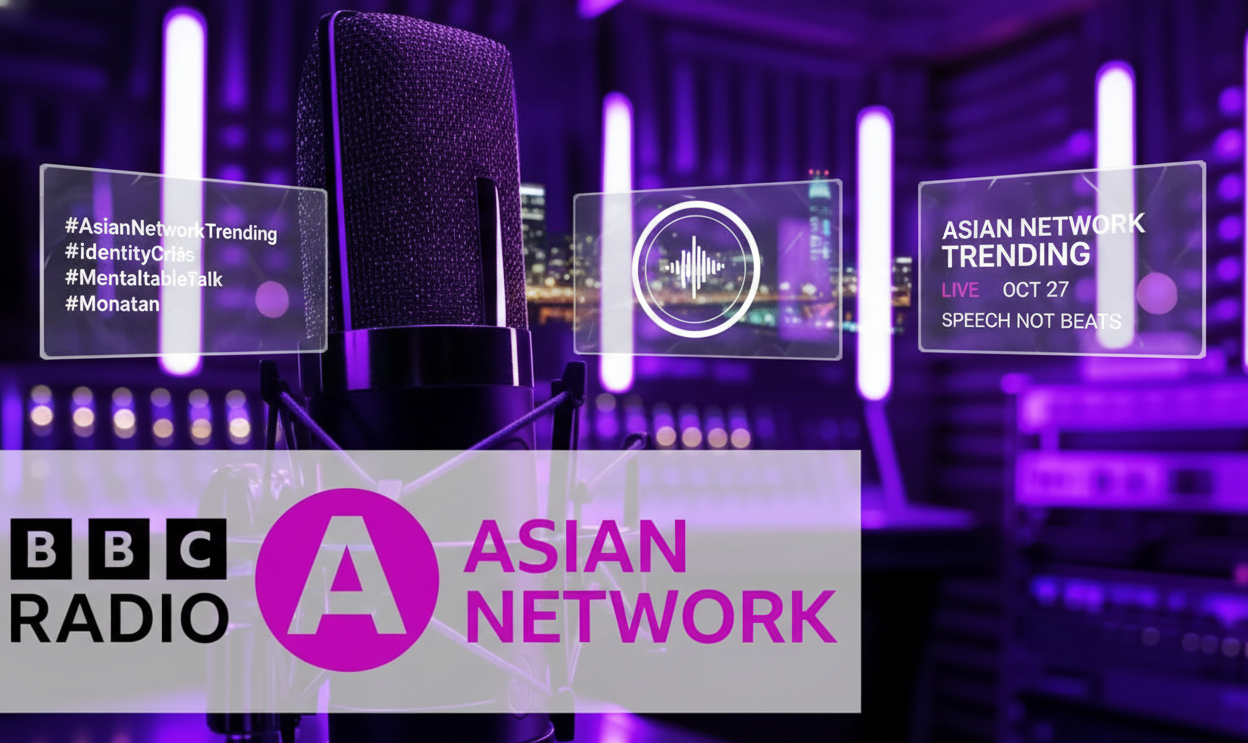Highlights:
- BBC Asian Network is starting a new show called Asian Network Trending.
- The show runs for two hours every week and is made for young British Asians.
- It covers the topics that matter most to them like what’s trending online, questions of identity, mental health etc.
- Amber Haque and the other hosts will share the show in turns, each talking about the issues they know and care about.
- The network is moving to Birmingham as part of bigger changes behind the scenes.
Speaking up isn’t always easy. This show gives young people a space where their voices can be heard. Music on the radio, sure. Bhangra, Bollywood hits, endless remixes. But real conversations about identity, family pressure, mental health? Rarely. Until now.
From 27 October, Asian Network Trending goes live every Wednesday night for two hours of speech instead of beats. The first hour dives into trending news; the second hour goes deeper into family expectations, workplace racism, LGBTQ+ issues, and mental health stigma. And it’s not just one voice. Amber Haque and other rotating presenters keep it fresh.

What exactly is Asian Network Trending?
Two shows in one, really.
First hour: The hot takes. Social media buzzing? Celebrity drama? Immigration news? Covered while it’s relevant.
Second hour: The deep dive. One topic per week, unpacked with guests and people who know what they are talking about. Mental health, dating outside culture, career pressures, unspoken hierarchies, all of it finally getting the airtime it deserves.
Head of Asian Network Ahmed Hussain said the new show was designed to give space for thoughtful and relevant conversation. “It’s a bold new space for speech, discussion and current affairs that reflects the voices, concerns and passions of British Asians today,” he said.
Why go for a rotating hosts format?
It is because you can’t sum up the “British Asian experience” with just one voice. A kid in Leicester whose family speaks Gujarati has a very different life from a Punjabi speaker in Southall and a Muslim teen’s day-to-day reality isn’t the same as a Hindu’s or Sikh’s. Then there’s money, family pressures, school, work, and everyone is navigating their own different path.
Why now? Why speech radio?
British Asians are visible, sure. Big festivals, business power, cultural moments. Yet mainstream media often treats the community like a footnote.
Music connects to heritage, yes. But it can’t talk about why your mum nags about you becoming a doctor when you want to study film. Radio forces that engagement, intimacy, and honesty.
Surveys back it up. 57% of British South Asians feel they constantly have to prove they are English. 96% say accent and name affect perception. This show is a platform for those contradictions to exist out loud.
Who’s on air and why does it matter?
Amber Haque is first up, but the rotating system means different voices each week. BBC Three and Channel 4 experience under her belt helps navigate sensitive topics without preaching.
Representation isn’t just faces. It’s who decides what stories get told, who gets to question, who sets the tone. Asian Network Trending is designed to widen that lens, not narrow it.
What topics will the show cover?
- Identity and belonging: balancing Britishness and South Asian heritage.
- Mental health: breaking taboos in families.
- Careers: that awkward "but why?" when you mention graphic design and the side hustle your parents call a hobby.
- Relationships: the 'who's their family?' interrogation and the quiet terror before saying you're gay.
- Community: the aunty and her "fairness cream" comments or the gap between your life and your grandparents' world.
Challenges and stakes
British South Asians aren’t all the same. Differences in religion, language, region, and class make their experiences varied and complex. Cover one slice and you alienate the rest. Go too safe and the younger audience won’t listen. Go too risky and conservative backlash is real.
Another big challenge: resources are tight.
Speech radio costs money: producers, researchers, fact checks.
Can it sustain deep conversations without cutting corners? That is the test.
What could success look like?
Not just ratings. Real impact: young people hear themselves articulated, families spark conversations, new voices get a platform and ultimately policymakers listen. Even a single clip prompting debate online counts. The proof is in that engagement, in messy human response, not charts.
A mic, not a manifesto
This launch isn’t a cure-all. It’s a step, a loud, messy one. It hands the mic to people who mostly spoke filtered, cautious words. Let it stumble, argue, and surprise. Let it be uncomfortable. If it does that even sometimes, it has already done its job. Because for the first time, British Asian youth get to hear themselves, not through music, not as a statistic, but as real, living voices.





